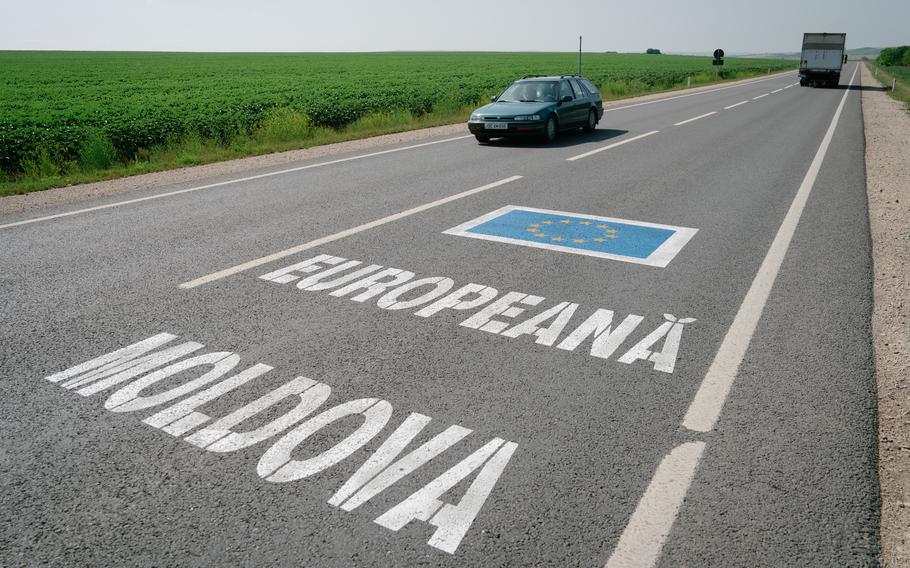
A sign on a road, financed by the European Union, outside Comrat, Moldova, on Tuesday, June 11, 2024. (Andrei Pungovschi/Bloomberg)
Moldova’s chief negotiator in talks to join the European Union said Russia has pumped about $108 million into an effort to thwart a crucial election Sunday through disinformation and destabilization operations and payments to voters.
Deputy Prime Minister Cristina Gherasimov, who’s in charge of the former Soviet republic’s European integration, warned days before Moldova’s presidential election and referendum on EU accession that such tactics could be exported elsewhere if they succeed.
“One thing needs to be clear for our partners: We are a testing ground for new methods — and anything that will work in Moldova will be used in other countries as well,” Gherasimov said in an interview this week in Brussels.
Moldovan President Maia Sandu will seek a second term in office on Sunday and press her pro-European course forward with the EU referendum. The nation of 2.6 million, wedged between Romania and Ukraine, is on course to break the Kremlin’s grip over its energy resources and political system that’s existed in the decades since the collapse of the Soviet Union.
Even as polls show a majority of Moldovans backing EU accession, authorities have warned of unprecedented Kremlin attempts to upend democratic institutions. Those include potentially fomenting violence with weapons, explosives and drones, Moldova’s police chief, Viorel Cernauteanu, said Thursday.
The chief outlined on Thursday what he said were Kremlin-led sabotage plans involving more than 300 trained operatives deployed to provoke election-related protests. Those plans were coordinated by groups tied to the late Yevgeny Prigozhin, the head of Russia’s mercenary Wagner Group, he said.
Cernauteanu also said earlier in October that payments were made to some 130,000 people, or 5% of Moldova’s population, to undermine the election while voting for Kremlin-backed groups in the presidential race.
‘Stakes Are Quite High’
Gherasimov said Russia’s priority is to prevent Moldova from becoming an EU member state by spreading a narrative that a turn toward Brussels is tantamount to choosing war. The invasion of Ukraine is projected to instill fear in hopes that more Moldovans may reject accession in the referendum, she said.
A pro-Kremlin government in Moldova is seen in Moscow as providing stronger leverage in the conflict against Ukraine, particularly with Russia’s troop presence in the breakaway region of Transnistria, according to the deputy premier.
“The stakes are quite high in Moldova for Russia — they want to keep Moldova in a gray zone,” Gherasimov said.
Moldova’s aim is to join the 27-member bloc by 2030. The country is counting on Western support to fight Russian interference — including through a new strategic communications center aimed at combating disinformation. Authorities in the capital Chisinau rely on technical know-how of allies in the West, Gherasimov said.
European Commission President Ursula von der Leyen this month unveiled a record €1.8 billion in assistance for Moldova, to help boost an economic recovery in the fallout of the war in Ukraine. The country’s economy contracted 4.6% in 2022 and registered only a mild rebound last year.
Gherasimov called the end-of-decade goal to join the bloc ambitious. The main challenges will be addressing the economy — which has potential to double in the next 10 years — and breaking down corruption in the justice system, the deputy premier said.
“We are in an internal war with our own judges and prosecutors who have benefited for decades from a very corrupt and closed system and that slows down the reform,” Gherasimov said. “But we are determined to continue.”
Those efforts have suffered from a lack of resources. The country’s top anti-corruption official, Veronica Dragalin, told Bloomberg that vetting efforts prompted a wave of resignations, leaving her office far short of the number of prosecutors needed to carry out the task.